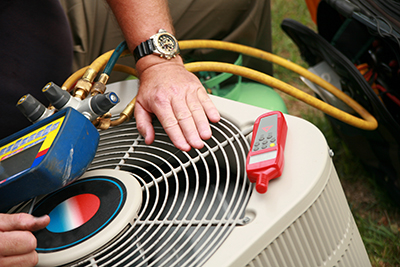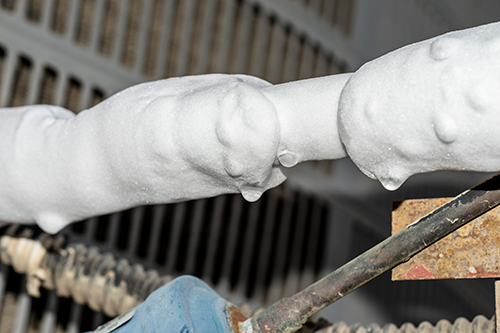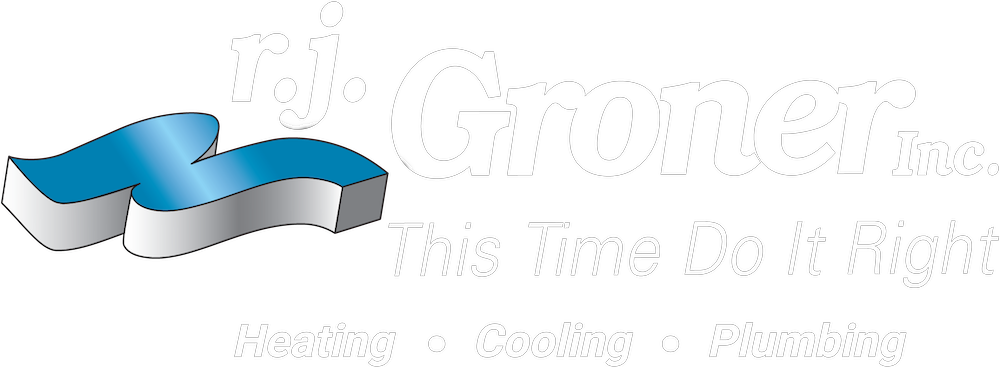Updated 6/30/24
We’ve all been there: you’re enjoying your summer evening, relaxing in your cool home, when suddenly, it’s not so cool. You walk over to the thermostat and see that the temperature is much higher than you set it at, and no air is coming out of your vents.
What do you do? Aside from panic, there are many AC troubleshooting tips that you can check off yourself before making a costly service call for AC repair.
Try to Stay Ahead of It
Thousands of people are hospitalized every year due to heat-related illnesses. This is why it is important to ensure your AC unit is working correctly before the sweltering summer months arrive.

In many cases, life gets in the way, and the “out of sight, out of mind” philosophy kicks in. You don’t think about your AC because everything is running smoothly. It’s not until your air conditioning is not cooling your house or your AC is making strange noises that you remember you meant to check everything in the spring.
AC Troubleshooting Checklist
Have no fear! Your AC not cooling could be fixed easily. You need to know where to look to find the problem.
Electrical Issues
Sometimes, the breaker can trip without the switch being in the off position. Look for the breaker marked “AC,” “air conditioner,” “HVAC,” or something similar, and flip it off and on again.
If you hear your unit come on, you’ve fixed the issue. If not, continue the checklist below until you’ve identified why your AC isn’t cooling.
Check Your Thermostat
One of the first things people do when they realize their air conditioning is not cooling is to check their thermostat. It’s one of the most common reasons your ac is not working and thankfully, can be a quick and simple fix.
If your thermostat is blank or the battery indicator is flashing, change the battery. If the thermostat is still malfunctioning or you don’t hear your unit turn on, it may be time for a new one.
There’s an Issue With Airflow
A dirty air filter can restrict the airflow, causing your AC to not run efficiently or at all. Dirt and dust can block the intake, causing your air conditioner to work overtime to get it to cool. This leads to your evaporator coil freezing and your house having warm air trying to “cool it,” if any air is flowing at all.
Make sure you change your AC filter every 30 days unless otherwise noted by the manufacturer. If your filter is dirty, try replacing it and giving your unit time to thaw out before turning your AC back on.
If you’ve determined your coil is frozen, turn it off. Allow 24 hours for your handler to defrost before turning it back on. This definitely takes a lot of willpower and patience, especially when it happens during the summer, but you don’t want to risk causing further damage to the motor or electrical system.
Condenser Is Clogged/Blocked

The condenser outside should always be free from weeds, grass, leaves, and critters. You can’t help the critters part or leaves that fall from trees in most cases, but you can make sure the area near the unit is as clear as possible from weeds and grass.
If you suspect something has gotten into your condenser and is keeping it from operating, call a licensed HVAC company out for AC maintenance.
Low Refrigerant Charge or Leak
This is another common issue that people run into but a licensed HVAC or AC company should handle it. Refrigerant or coolant is necessary for air to cool and when it’s low or leaking, you’ll only feel warm air coming out of your vents.
The good news is, if your coolant is low, it can easily be recharged without breaking the bank. If the service technician finds a leak, they will either be able to repair your AC unit or can explain any further steps needed to make it work properly again.
Coil Issues
There are two kinds of coils in an AC unit. The indoor part is an evaporator coil that receives the refrigerant/coolant and turns it into a gas.
The outdoor condenser pressurizes the refrigerant, turning it back into a liquid. The coil releases heat with the help of an exhaust fan and returns the refrigerant back to the inside handler.
It’s a complicated process and the coils are a delicate and important part of it. Pet hair, dust, and fibers can all affect the evaporator (inside) coil.
The condenser coil can be stalled by debris (as previously mentioned) or by an electrical interruption. This is difficult to detect because the exhaust fan can still run, leading you to think it’s an indoor problem when it could be your condenser coil.
Aside from clearing grass, weeds, and leaves from your unit, you will need an HVAC professional to determine if something is wrong with your outdoor unit. If you do choose to investigate yourself, make sure you turn the AC breaker off before you do anything!
Your AC Wasn’t Installed Properly
If your unit was recently installed, something may be wrong with the installation. Most companies will offer a warranty period on their work so it’s best to contact the company immediately.
It’s Time For a New Unit
The worst-case scenario is that your unit is old and it’s just time for a new one. Unfortunately, new AC units can be expensive and some companies try to oversell panicked customers who are desperate for cool air.
While you wait for a sales person or service tech to come out, research what size unit you need to run your home and the different makes and models available.
Not Having AC Can Be a Pain but We Can Help
We’ve been servicing the Poconos and surrounding area since the 1960s and truly believe you, the customer is our top priority. Our live operators are on hand to handle your emergency 24/7. Call us at (570) 595-1010 or submit a service request online.
What should I do if my AC coils are dirty?
Dirty coils can impact your AC’s efficiency. Regular maintenance, including cleaning or replacing dirty coils, can help restore optimal performance.
What steps should I take if my newly installed AC isn’t working correctly?
If your newly installed AC isn’t functioning as expected, contact the installation company promptly. Most companies offer warranty coverage for their work and can address any installation-related issues.
How can I determine if it’s time to replace my AC unit?
If your AC unit is old or experiencing frequent issues, it may be time for a replacement. Research different makes and models to find the best option for your home’s cooling needs.
We’ll be happy to help you with your AC or heating system troubleshooting and any other questions you may have regarding your system. Our blog has helpful tips on everything from keeping your costs down to choosing the best heating and cooling system for you.





